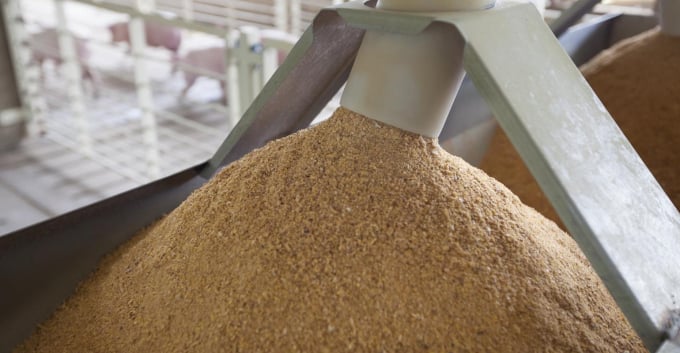November 19, 2025 | 07:50 GMT +7
November 19, 2025 | 07:50 GMT +7
Hotline: 0913.378.918
November 19, 2025 | 07:50 GMT +7
Hotline: 0913.378.918
Previously, soybean meal (SBM) imported to Vietnam was exempt from tax. But since January 1, 2016 when Circular 182/2015/TT-BTC took effect, imported SBM has been subject to 2% tax.
At that time, many livestock experts reckoned that the imposition of tax on imported SBM would increase the cost of animal feed, thereby increasing the cost of livestock and making it difficult for Vietnamese livestock products to compete against foreign counterparts.
It is due to the fact that SBM accounts for a large proportion in all types of feed, even a large proportion in poultry feed and aqua feed. Specifically, information revealed by some livestock industry experts shows that soybean meal accounts for 12-18% in animal feed, 18-32% in poultry feed and 35-40% in aqua feed.
Because of its significant proportion, the total demand for soybean meal has also increased significantly when the total amount of feed produced in Vietnam has increased over the years. . In 2011, the total demand for SBM was nearly 3.1 million tons. By 2020, total demand for SBM reached more than 6 million tons, almost double the amount of 10 years ago.
Most of SBM has been imported to meet the domestic demand. The total demand for SBM was approximately 3.1 million tons in 2011, imports amounted to more than 2.7 million tons, worth nearly $1.2 billion. In 2020, SBM imports were more than 5.1 million tons (worth more than $1.9 billion) out of a total demand of 6.019 million tons. In the first half of 2021, nearly 2.4 million tons of SBM were imported to Vietnam, worth more than $1.2 billion, accounting for 83.7% of the total amount of SBM.
Notably, like many other feed ingredients, the price of imported SBM has increased dramatically since the beginning of the year. In 2020, the price of imported SBM to Vietnam was at an average of 376 USD/ton, that price reached an average of 514.7 USD/ton, up 37%, in the first half of this year.

Most of the soybean meal used in Vietnam has been imported. Photo: TL.
In addition to imported sources, soybean meal is also supplied from a number of domestic soybean oil companies, but domestic production still accounts for a relatively modest proportion of total demand. According to estimates of some livestock industry experts, the total amount of domestic SBM will only meet about 15% of the demand by 2020.
Thus, it can be seen that Vietnam's feed industry is being largely dependent on imported SBM; however, as the price of imported SBM has increased sharply, the price of feed is also rising as well.
Notably, like many other feed ingredients, the price of imported SBM has increased dramatically since the beginning of the year. In 2020, the price of imported SBM to Vietnam was at an average of 376 USD/ton, that price reached an average of 514.7 USD/ton, up 37%, in the first half of this year.
In addition to imported sources, soybean meal is also supplied from a number of domestic soybean oil companies, but domestic production still accounts for a relatively modest proportion of total demand. According to estimates of some livestock industry experts, the total amount of domestic SBM will only meet about 15% of the demand by 2020.
Thus, it can be seen that Vietnam's feed industry is being largely dependent on imported SBM; however, as the price of imported SBM has increased sharply, the price of feed is also rising as well.
According to the information from the livestock industry, the price of animal feed has increased by an average of 7 times (a total increase of about 20-30%) since November 2020. Such prices seem to increase every month.

Soybean meal accounts for 35-40% of aqua feed. Photo: Huu Duc.
Specifically, in the first price increase in November 2020, the prices of all kinds of food increased from 120-260 VND/kg. In the second price increase (December 2020), the prices increased from 140 - 375 VND/kg. Earlier this year, after increasing 150-380 VND/kg in January, feed prices in February 2021 increased by 200-500 VND/kg. In March, feed prices increased the most with an increase of 270-500 VND/kg. The increase in April was slightly lower, from 220-400 VND/kg. And by the beginning of May 2021, a series of feed companies simultaneously notified agents and customers about the increase in feed prices.
As mentioned above, SBM accounts for a significant proportion in the composition of animal feeds, poultry feeds, aqua feeds and the vast majority of SBMs used in Vietnam's feed industry are imported. Therefore, in order to reduce the cost of feed, imported SBM should also be considered to reduce import tax from the current 2% to 0% as before.
Not long ago, in 2019, in a document sent to the Tax Policy Department (Ministry of Finance) on commenting on the Draft Decree amending the Import and Export Tariffs, the Vietnam Chamber of Commerce and Industry (VCCI) ) also suggested a tax reduction plan for imported SBM.
At that time, the drafting agency said that soybean meal (with import tax rate of 2%) was the raw material for the production of fermented soybean meal (with import tax rate of 0%). According to rules, the import tax rate of raw materials should be equal to or lower than the import tax rate of the products. Therefore, the drafting agency proposed to raise the import tax on fermented soybean meal from 0% to 2%.
VCCI argued that fermented soybeans have been mainly used to make feed. The increase in import tax on this item may increase the price of feed, negatively impacting the development of this industry in Vietnam. In order to ensure the correct principle of import tax without affecting the domestic livestock industry, VCCI proposed the drafting agency to consider a plan to reduce the tax on soybean meal from 2% to 0%.

(VAN) More than 100 shoppers queued for a chance to get a kilo or so of Japanese rice for 500 yen ($3.32) by heaping as much grain into a small wooden box as possible.

(VAN) Benchmark international prices of milled declined in October as harvests started or improved in some parts of the globe.

(VAN) Show cause orders will be issued to retailers who sell imported rice at prices exceeding the maximum suggested retail price (MSRP) of P43 per kilo, Philippines Agriculture Secretary said in a statement on Thursday.

(VAN) Coffee prices on October 20, 2025, remained stable domestically, trading at 113,500–114,500 VND/kg. Similarly, global coffee prices also moved sideways.

(VAN) By October, Vietnam’s coffee exports had surpassed USD 7 billion for the first time and will exceed USD 8 billion within this year.

(VAN) Illinois rancher says Texas, Oklahoma, Kansas lost grass and forage, forcing massive cattle liquidation.

(VAN) Coffee prices on October 12, 2025, remained flat, trading at VND 113,000–VND 114,000/kg. This week, coffee prices continued to decline sharply.